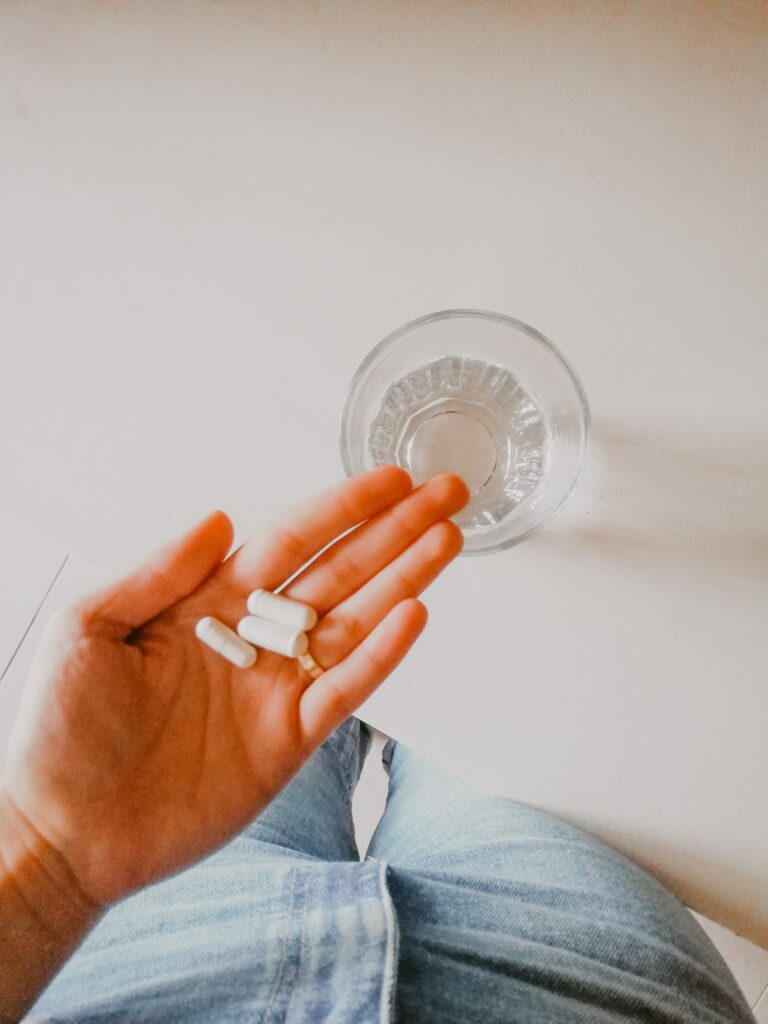In today’s fast-paced (and toxin-laden world), hormonal imbalances are practically the norm. In fact, it’s estimated that a whopping 80 percent of women suffer from hormone woes. And the worst part is? These imbalances fly under the radar. Women go undiagnosed for years—if not, decades—chalking up their intense mood swings, tender breasts, and painful periods to what they’ve been taught is a part of womanhood. It me. While there are a number of factors that contribute to hormonal issues, supplements can often play an important role in restoring balance. That said, the supplement industry is vast. Together, let’s parse through the noise and explore the best supplements for hormone balance in women.

What Causes Hormone Imbalances?
A variety of factors. One of the most common causes? Abnormal fluctuations in estrogen and progesterone. Although these hormones fluctuate (naturally) during our cycles, tipping the scale too high or too low causes imbalances. Other contributing factors: stress, poor diet, lack of exercise (or too much exercise), certain medications—like birth control—and exposure to toxins or pollutants. Ultimately, it’s important to get to the underlying cause(s) of your hormone imbalance(s). Pregnancy aside, any of these things can alter your menstrual cycle:
Birth control
The birth control pill may make your periods shorter and lighter (or disappear, entirely). At any rate, the pill suppresses your body’s natural hormonal rhythms while also depleting it of vital nutrients, like B vitamins.
Polycystic ovary syndrome
This hormonal imbalance prevents an egg from developing normally in the ovaries. PCOS causes irregular menstrual cycles and missed periods. Upwards of 70 percent of women are unaware of conditions like PCOS!
Fibroids
These noncancerous growths in your uterus can make your periods longer and heavier than usual.
Inflammatory diet
Oftentimes, the root cause of hormonal imbalance is inflammation. Chronic inflammation can damage the cells in your endocrine glands. What’s surprising is that the inflammation (that causes hormonal imbalances) often starts in the gut.
endocrine disruptors
When absorbed in the body, an endocrine disruptor can decrease or increase normal hormone levels, mimic the body’s natural hormones, or alter the natural production of hormones.
eating disorders
Anorexia, bulimia, and other eating disorders can disrupt your menstrual cycle and make your periods stop. For balanced hormones, you need to make sure you’re eating enough.

7 Signs of hormone imbalance
Whether it’s irregular periods, mood swings, or other symptoms, hormone imbalances can be frustrating and even debilitating. That’s why many women turn to hormone-balancing supplements to help restore balance and alleviate symptoms. With a wide range of options on the market, these supplements promise to help regulate hormones and promote overall health. But do they live up to the hype? Before we dive in, let’s look at common signs of hormone imbalance.
Irregular (or absent) menstrual cycles
A typical menstrual cycle ranges from 25 to 32 days. If this doesn’t quite add up with your normal monthly cycle, it could be a sign of hormonal imbalance. Irregular periods can also be a sign of PCOS.
Heavy periods
Normal period bleeding should last 4-7 days and the amount of blood lost is small (2 to 3 tablespoons). However, women who have menorrhagia usually bleed for more than 7 days and lose twice as much blood likely have elevated estrogen.
Infertility
Hormonal imbalance can make conception very tricky. If you’ve been trying to conceive for six months without success, it may be time to speak with your doctor. See here for my fertility checklist!
Night sweats and hot flashes
Do you experience hot flashes throughout the day—or wake up covered in sweat? These symptoms are a red flag for hormone imbalance and are likely due to a drop in estrogen levels.
Persistent weight gain
Sudden (or stubborn) weight gain, as well as trouble losing weight, are two of the many uncomfortable and frustrating symptoms of hormonal imbalance. Consider getting a hormone panel done with your doctor, as well as getting your thyroid checked.
Hair loss
There are a wide range of conditions that cause hair loss, some of the most common being pregnancy and PCOS.
Pelvic pain
Do you notice pelvic pain during your period or intercourse? If so, they could be signs of a hormonal imbalance creating endometriosis (implants of tissue outside the uterus), fibroids (which are estrogen driven), or ovarian cysts.

Do You Need to Take Supplements to balance your hormones?
The million-dollar question. While supplements are heavily marketed, not everyone needs them. Some women who have hormonal imbalances don’t require additional vitamin, mineral, and herbal supplements. They’re able to regain their cycle, minimize PMS, etc. by eating a nourishing diet and keeping blood sugar balanced. However, keep in mind that there’s a difference between a “reference range” and an “optimal range” for nutrients. When balancing hormones, optimal is ideal. At the end of the day, supplements can be incredibly useful for filling gaps in your diet and helping you reach optimal hormone levels. My supplement guide is here to do both.
How to create a supplement regimen
In just two steps, learn how to choose the right vitamins and supplements for you.
1. The Foundation Level
When it comes to supplements, a solid foundation is key. These are supplements that most people benefit from—whether or not they’re trying to balance their hormones. The supplements comprising this level support basic life processes. Think: cellular energy production, growth, repair, and regeneration. These are essential nutrients for living well as a human.
Multivitamin: fills nutritional gaps.
Omega-3 fatty acids: helps decrease system-wide inflammation and supports brain health.
Vitamin D + K2 + CoQ10: aids in bone health, immunity, and heart health.
Pre / probiotic: supports a healthy gut microbiome for digestion and immune health.
Magnesium: relieves muscle soreness while improving sleep quality, stress, and nerve function (I also love Cymbiotika).
2. The Personalization Level
Next, the personalization level. This is all about you, specifically. If you’re struggling with hormonal issues, insomnia, blood sugar imbalance, achey joints, allergies, gut issues, adrenal stress, etc., you’ll want to add other supplements to your routine. Depending on where you are in your fertility journey, this is also where you’d add in a prenatal! The goal here is to best support your personalized health goals. We can work together to set you up for success.

When is the best time to take supplements?
This depends. Some supplements are time-specific, so it’s important to research individual recommendations. However, most are generally flexible. What matters is choosing a time you know you can be consistent with. As for the empty stomach versus food debate—some vitamins are fat-soluble and some are water-soluble. Fat-soluble, like vitamin D, should be paired with a source of fat (take with food or pair with a fat-forward supplement, like fish oil). Some vitamins only need to be paired with water, like B and C. For me personally, I like to take my probiotic and magnesium shortly before bed. Otherwise, I consume the rest of my supplements in the morning (with breakfast).
How Long Does It Take to Balance Hormones?
Research shows that you can balance your hormones in less than four months by taking a holistic, consistent approach. In fact, you can significantly reduce the number of chemicals in your body in one week. How so? Switch to an organic diet. And in less than 10 days, you can improve your blood sugar by eating less sugar (a main culprit in estrogen dominance). By incorporating more fermented foods and a potent probiotic, women can more easily detox estrogen, which helps balance hormones—in less than two months. By four months, eating a hormonally-supportive diet makes an impact, slowing the aging process and protecting fertility.

Supplements for hormone balance
In addition to eating a well-rounded diet and seed cycling, below are general recommendations for hormonal imbalance. Please consult your physician or healthcare provider before making changes to your supplement routine.
Vitamin D / K2
Did you know that vitamin D is actually a hormone? Every cell in the body has a receptor for vitamin D. Vitamin D is responsible for hormone health, immune regulation, absorption of calcium and phosphorus, maintenance of healthy bones, and protection against multiple diseases. As a fat-soluble vitamin, take it with your fattiest meal of the day. Last but not least, vitamin K2 is ideally taken with vitamin D, as vitamin K2 is the key to bone health. It helps to ensure vitamin D gets to your bones.
vitamin d Supplement
B Vitamins
Each B vitamin has a different function: reducing inflammation, supporting hormonal function, supporting nerve and heart health, and maintaining a healthy metabolism and digestive system. If you’re currently on birth control, consider adding this supplement to your regimen—data shows that birth control depletes the body of B vitamins. Low levels of B12 can cause extreme fatigue, anemia, numbness, and more. Below is my favorite B vitamin supplement. It provides a whole-food source of all eight B vitamins + choline, inositol, and PABA.
B vitamin COMPLEX Supplement
Fish oil
Due to large doses of industrial seed oils, most Americans aren’t consuming enough omega-3 fatty acids (present in fish oil). To combat this, it’s helpful to include an omega-3 supplement! The best omega-3 comes from fish oil, like cod liver oil. Omega-3 fatty acids are the starting point for making hormones that regulate everything from blood clotting to inflammation. They’re also a wonderful source of lignans—compounds that may have a weak estrogen effect.
Omega-3 Fish oil supplement
Beef liver
Grass-fed beef liver contains crucial vitamins for the production of certain hormones: pregnenolone, progesterone, and DHEA.
Beef Liver Supplement
Magnesium
Magnesium is a cofactor in more than 300 enzyme systems that regulate diverse biochemical reactions in the body. This includes calming the nervous system, improves blood sugar balance, activates vitamin D, supports thyroid health, and can help minimize PMS.
Magnesium supplement
Probiotic
Consider adding a spore-based probiotic to your supplement routine (especially if you don’t eat fermented foods, dairy, etc.). Unfortunately, our gut’s delicate ecosystem can be broken down by a number of influences—antibiotics, stress, sugar, and chemicals. Consuming probiotic-rich foods—like sauerkraut, yogurt, and kimchi—as well as supplementing with probiotics can support your digestion, hormones, and more.
Probiotic Supplement
DIM
Estrogen dominant? Consider a DIM supplement. DIM supplements appear to help adjust the hormone, estrogen. A few clinical trials have shown that it supports healthy estrogen levels, lowering the risk of certain cancers and diseases that are linked to estrogen.
DIM Supplement

Hormone balance ebook
Ready to take the next step in your hormone-healing journey? Grab your copy of Master Your Menstrual Cycle—my holistic guide to balancing your hormones with ease. Available for only $15!
Images courtesy of Unsplash. This article contains affiliate links. Thank you for supporting Wellness with Edie. This article is for informational purposes only. It is not, nor is it intended to be, a substitute for professional medical advice, diagnosis, or treatment and we recommend that you always consult with your healthcare provider.



Leave a Reply